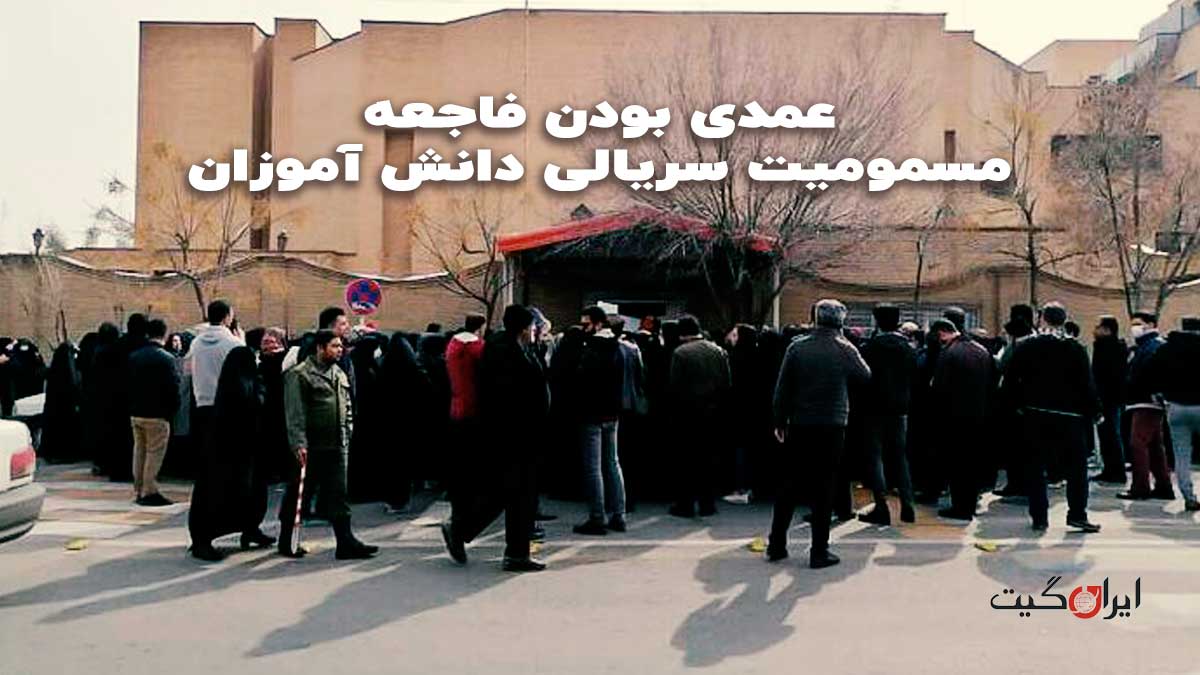The intentional nature of the poisoning tragedy of students, Part 3
According to Iran Gate, the intentional nature of the poisoning tragedy of students has been reported simultaneously with the revelation of new dimensions of intentionality in the poisoning of students. It is also heard that domestic media outlets are limited in covering this security issue, similar to the acid attacks in Isfahan, in terms of quality, subject to concealment and lack of follow-up by security agencies.
Iran Gate, in line with its mission of transparency and media awareness, has specifically investigated and followed up on this case, while preserving the security of informed sources, and is trying to provide information in this case with their assistance.
After three months since the start of intentional poisoning of students, mostly girls, in Iran, security institutions have not yet published any reports of identification or actions taken regarding it. However, pressures to deny some published reports in this regard have increased. Media outlets affiliated with the government claimed on the evening of Monday, the seventh of Esfand, that the death of an 11-year-old girl named Fatemeh Rezaei in Qom is not related to serial poisonings in Iranian schools.
The suspicious poisonings in Qom schools started on the 9th of Azar and have now spread to other cities in the country, according to the state news agency IRNA. On Monday, the 8th of Esfand, IRNA approached Abolghasem Rezaei, the father of Fatemeh Rezaei, and fabricated reports about the connection between the death of this student and the poisonings, labeling it as anti-revolutionary propaganda by opposition networks.
IRNA also published statements from Mr. Rezaei, which were unlike the usual forced confessions aired on Islamic Republic television. Abolghasem Rezaei, the father of Fatemeh, stated that his daughter had never been poisoned when she went to school, and during her time at school, there were no problems or reported incidents.
However, the symptoms he described for his daughter’s illness are almost similar to the symptoms that the media have recently announced as signs of suspicious poisonings among students. Mr. Rezaei mentioned that his daughter had experienced headaches, chest pain, vomiting, and fever as symptoms of her illness, and he added that she died due to severe infection. Nevertheless, he emphasized that doctors and specialists did not diagnose any signs of poisoning.
The statements by Fazl Meibodi caused controversy.
Iran News Agency (IRNA) approached Mohammadtaghi Fazeli-Meybodi, a member of the Assembly of Qom Seminary Scholars, who had previously stated to Shargh newspaper that these poisonings are the work of extremist groups in Iran. However, IRNA reported that I told the Shargh newspaper reporter that this issue should not be raised, as it is an incomplete investigation and research on this matter is ongoing. Unfortunately, the reporter misrepresented my statement and should not have done so.
Mohammadtaghi Fazeli-Meybodi, a seminary teacher, stated on Monday, February 26th, in an interview with Shargh TV, regarding the increasing issue of poisoning of female students and the ambiguities surrounding the reasons and factors behind it, that this incident is deliberate and it is said that a group called ‘Hezarehgra’ is responsible for these serial poisonings in schools.
According to the statements of this cleric, this group and its ideology believe that girls should not study or, at most, they should only study until the third grade of primary school. He also described this movement as a religious and anti-modern movement.
Fazeli-Meybodi further added that a sociologist, whose name cannot be disclosed, has conducted research in Qom and has concluded that these poisonings are not accidental and that the ‘Hezarehgra’ group is responsible for them.
Afterwards, it was reported that Yunus Panahi, one of the deputy ministers of health, stated that these poisonings were intentional, and some individuals wanted all schools, especially girls’ schools, to be closed.
However, Mr. Panahi denied his statements on Monday and said that what has been attributed to me regarding the external causes and intentional nature of these poisonings is not confirmed, and there has been no exact quotation.
In his denial, he claimed that I have no information about the external causes and intentional nature of these poisonings, whether they were intentional or not.
The deputy minister of health says the poisonings are intentional.
Nevertheless, some members of the Islamic Consultative Assembly still emphasize the intentional nature of these poisonings. Fatemeh Maqsoudi, the representative of Borujerd, told Hammehe Melli newspaper that what we are certain about is that the investigation team that has arrived at the high schools in Qom emphasizes the intentional nature of it.
Despite speculations about these poisonings and the emphasis of government officials and some members of the Islamic Consultative Assembly on their intentional nature, intelligence and security agencies have not yet published any reports about the identification or possible arrest of the perpetrators.
The judiciary also announced on Monday, February 27th, that it has not yet reached any results in pursuing this matter. Mohammad Mosaddegh Khanemui, the First Deputy of the Judiciary, stated that the Qom prosecutor has entered this matter with seriousness due to its importance, but no results have been obtained so far.
Some informed sources in Qom’s medical and health centers, who requested anonymity, have told Iran Gate reporter that security centers were already aware of some of these poisonings.
A series of articles on student poisonings have been exclusively examined on Iran Gate. You can also read other parts of this article.


